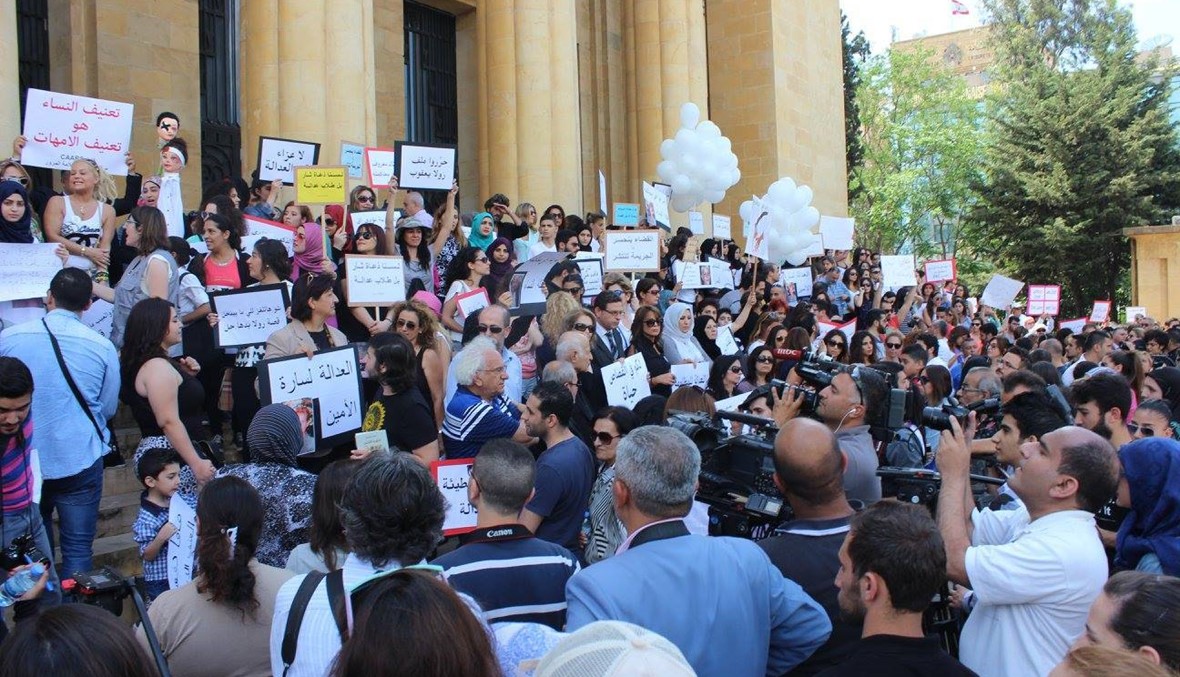
BEIRUT: Lebanese women are often seen as privileged compared to those in other Arab countries. The reality, however, is that they’re still far behind in terms of gender equality.
According to the gender gap index, Lebanon ranks third to last in the Middle East and North Africa (MENA) region; only Syria and Yemen have a worse gender gap ranking.
Domestic violence is a prevalent yet underrated problem in Lebanon. Lebanon has witnessed several high profile cases of husbands beating their wives to death. KAFA, the leading Lebanese NGO advocating for women’s rights, receives 2,600 calls in its domestic abuse helpline each year.
KAFA’S analysis of media reports shows 62 reported cases of violence against women between 2010 and 2015. Also, 25 women were killed by family members between 2010 and 2013 and four women died in 2014. According to a survey conducted in 2016, 31 percent of women in Lebanon had experienced intimate partner violence and 24 percent of men claimed responsibility for it.
Different reasons are behind the prevalence of domestic violence in Lebanon, but the ones that stand out are the social acceptance of such behavior, the patriarchal nature of the Lebanese society and the lack of support and financial resources provided to women in this regard.
The massive online campaigns surrounding domestic violence, launched in the past few years, have had a positive impact on women empowerment and social change. Nowadays, many women have the courage to speak up and break the social taboo by seeking help from NGOs.
Moreover, a noticeable change in the society’s attitude and behavior has been witnessed as a result of online campaigning. In this regard, the street mobilization and the online engagement in the recent years advocating against domestic violence are a great step forward in Lebanon.
However, more efforts need to be done, not only to motivate people to manifest against domestic violence, but also to push them and teach them how to react when they witness acts of domestic violence.
At the legislative level, the absence of an adequate law for domestic violence is a threatening barrier to women’s rights in Lebanon. After being pending since 2010, the Lebanese parliament finally passed the domestic violence law on April 1, 2014.
The new law is a result of multi-year campaigning led by a group of Lebanese women’s organizations, especially KAFA. Throughout the past few years, different campaigns were led by different NGOs, applying diverse strategies for the sole purpose of protecting women against domestic violence.
The new law establishes important protection measures and initiatives against domestic violence but fails to protect women from marital rape and other abuse. Unfortunately, one of the law’s main shortcomings is that it doesn’t criminalize marital rape. Also, the Lebanese government needs to address the country’s discriminatory personal status laws.
MORE TO BE DONE
Due to the large number of officially recognized religions in Lebanon, Lebanese family matters are governed by at least 15 personal statute codes. As a result, Lebanese women suffer discrimination under 15 different personal status laws.
In this regard, the solution would be to rely on a civil law when addressing domestic violence issues or to reform the personal status laws that often only encourage such violence. Another main shortcoming is that some involved parties such as lawyers, judges, and victims are still confused about how to use the law, while many people are still unaware of its existence.
The law also calls for special family-violence units within the police and a fund to assist victims of domestic violence. But these have not yet been implemented.
The law is incomplete and needs further amendments. Some activists, lawmakers and members of civil society have voiced their anger over the law’s inadequacy to remedy such grave issues.
The religious diversification of the Lebanese society and the existence of religious figures unsupportive of women’s rights are slowing down the efforts of the activists and the creation of a better law. Also, the political corruption in Lebanon is leading to the prioritization of political issues over social issues.
---------------
Nada Richa is a graduate of NDU University with a Master's Degree in Media Studies, where she presented a thesis entitled “The Impact of Online Activism against Domestic Violence in Lebanon on Women’s Empowerment and Social Change.” Richa is also a researcher in the Lebanese Center of Strategic Studies CLES.
-----------------
Welcome to “Naya,” the newest addition to Annahar’s coverage. This section aims at fortifying Lebanese women’s voices by highlighting their talents, challenges, innovations, and women’s empowerment. We will also be reporting on the world of work, family, style, health, and culture. Naya is devoted to women of all generations-Naya Editor, Sally Farhat:
Naya on Social Media:
Twitter:@BeirutNaya
Instagram:@NayaBeirut





 Messenger
Messenger
 Whatsapp
Whatsapp
 Threads
Threads
 Email
Email
 Print
Print
 X
X
 Facebook
Facebook

